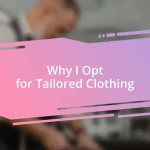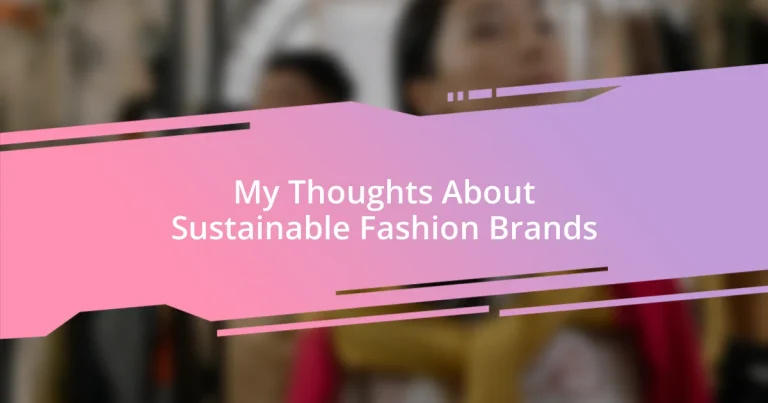Key takeaways:
- Sustainable fashion focuses on eco-friendly materials, ethical labor practices, and timeless designs, promoting a culture of quality over quantity.
- Transparency in production and supply chains fosters genuine connections between brands and consumers, encouraging informed purchasing decisions.
- The future of sustainable fashion rests on innovation, collaboration among brands, and a growing consumer preference for mindful purchasing habits.
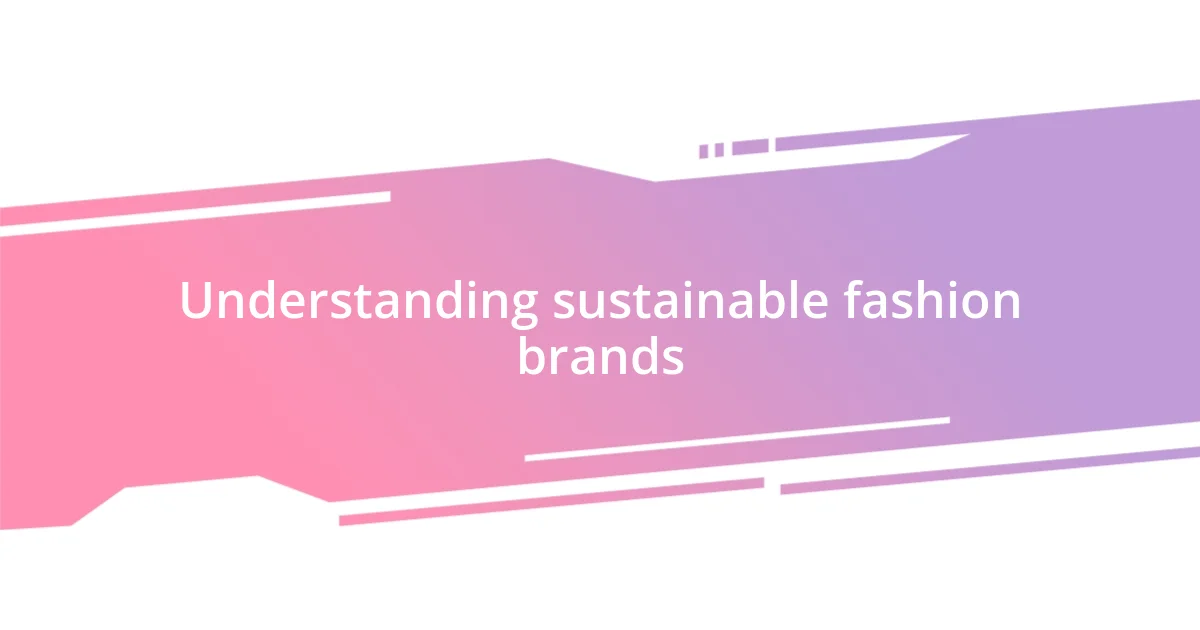
Understanding sustainable fashion brands
Sustainable fashion brands focus on environmentally friendly practices, from sourcing materials to manufacturing processes. I remember when I stumbled upon a small clothing line that used organic cotton; it felt wonderful to know my purchase was supporting both the planet and the artisans behind it. It raises a crucial question: how often do we consider the impact of our clothing choices on the environment and the people who make them?
Understanding sustainable fashion isn’t just about eco-friendly fabrics; it’s also about ethical labor practices. A few years back, I discovered a brand that shared stories about its workers, making me feel more connected to the clothes I wore. Don’t you think it adds a layer of meaning when you know the faces behind your wardrobe?
Moreover, sustainability in fashion encompasses longevity. Instead of following fleeting trends, I now opt for timeless pieces that I can cherish for years. This shift in mindset not only helps reduce waste but also allows me to invest in quality over quantity. Have you ever experienced the joy of wearing something that feels like part of your identity?
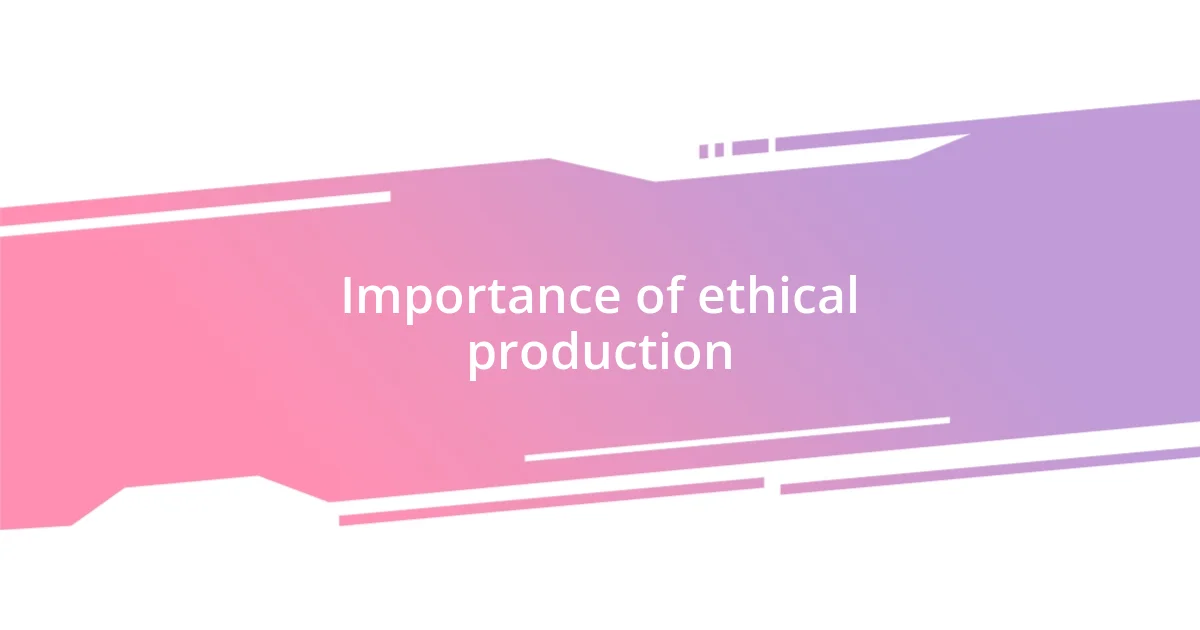
Importance of ethical production
Ethical production is essential because it prioritizes the well-being of workers throughout the supply chain. I recall an instance when I visited a local artisan market and saw firsthand the care and skill behind handmade garments. It made me realize the importance of ensuring that those who create our clothing are not subjected to unfair wages or unsafe working conditions. Supporting brands that commit to ethical production helps create a system where everyone benefits, from the maker to the consumer.
Let’s not forget the environmental impact of ethical production. When brands adopt sustainable practices, they often reduce waste and pollution. I once received a beautifully packaged dress made from recycled materials. As I unwrapped it, I felt a sense of satisfaction knowing I was part of a movement that respects the earth. This experience emphasized for me that fashion doesn’t have to come at the cost of our planet.
Ethical production also nurtures communities by fostering transparent and supportive relationships. Many small brands partner with local artisans to craft their products, which helps preserve cultural traditions and empower those communities. I once read about a sustainable fashion brand that supported women weavers in a marginalized area, giving them fair payment and resources to uplift their families. Knowing that my purchasing decisions contribute to such positive changes gives my wardrobe a deeper significance.
| Aspect | Ethical Production |
|---|---|
| Worker Rights | Ensures fair wages and safe working conditions |
| Environmental Impact | Reduces waste and pollution through sustainable practices |
| Community Support | Empowers local artisans and preserves cultural traditions |
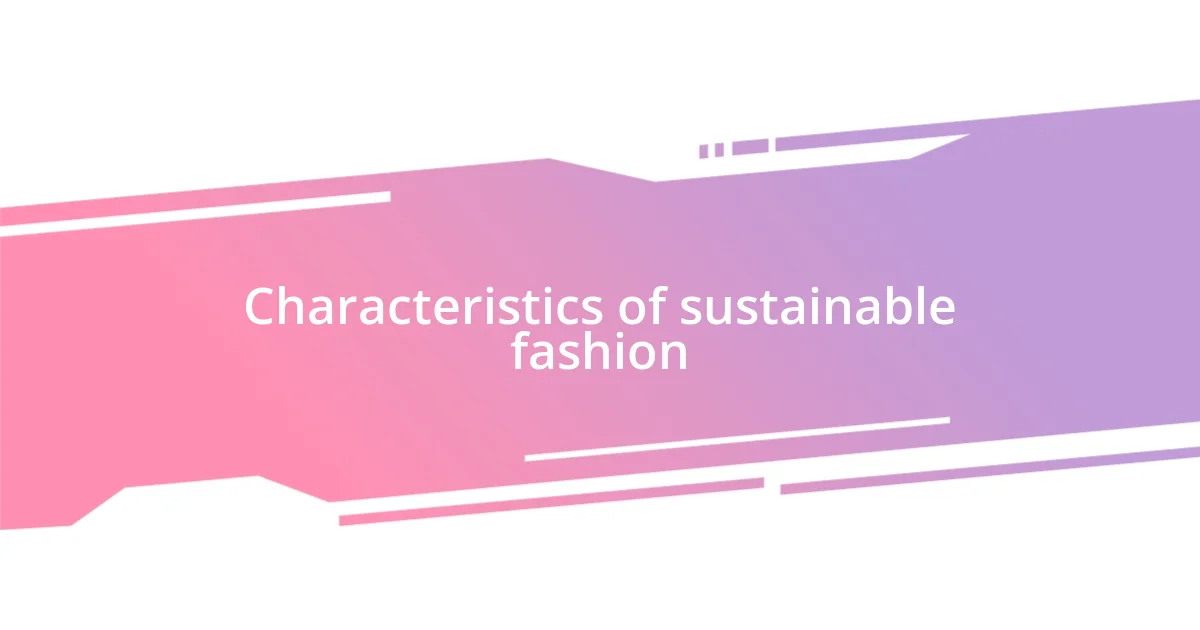
Characteristics of sustainable fashion
Sustainable fashion is characterized by its commitment to ethical and eco-friendly practices. For me, this journey began when I discovered a brand that sourced its materials from post-consumer waste. It was astonishing to see how discarded items could be transformed into stylish clothing. That realization led me to feel a sense of responsibility; every piece I bought not only represented my style but also supported a sustainable cycle.
Key characteristics of sustainable fashion include:
- Eco-Friendly Materials: Utilizing organic, recycled, and biodegradable fabrics that lessen environmental harm.
- Ethical Labor Practices: Ensuring fair wages and good working conditions for everyone involved in the supply chain.
- Timeless Design: Focusing on quality pieces that defy fast-fashion trends, encouraging consumers to invest in longevity rather than disposability.
I often reflect on my experiences with sustainable brands, particularly when I came across one that prioritized local production. The connection I felt to the artisans who crafted each piece was profound. Wearing clothing that carries a unique story makes my wardrobe feel like a personal narrative, intertwining my life with the lives of those craftsmen. It’s an emotional journey where each piece I wear becomes a reminder of the values I hold dear.
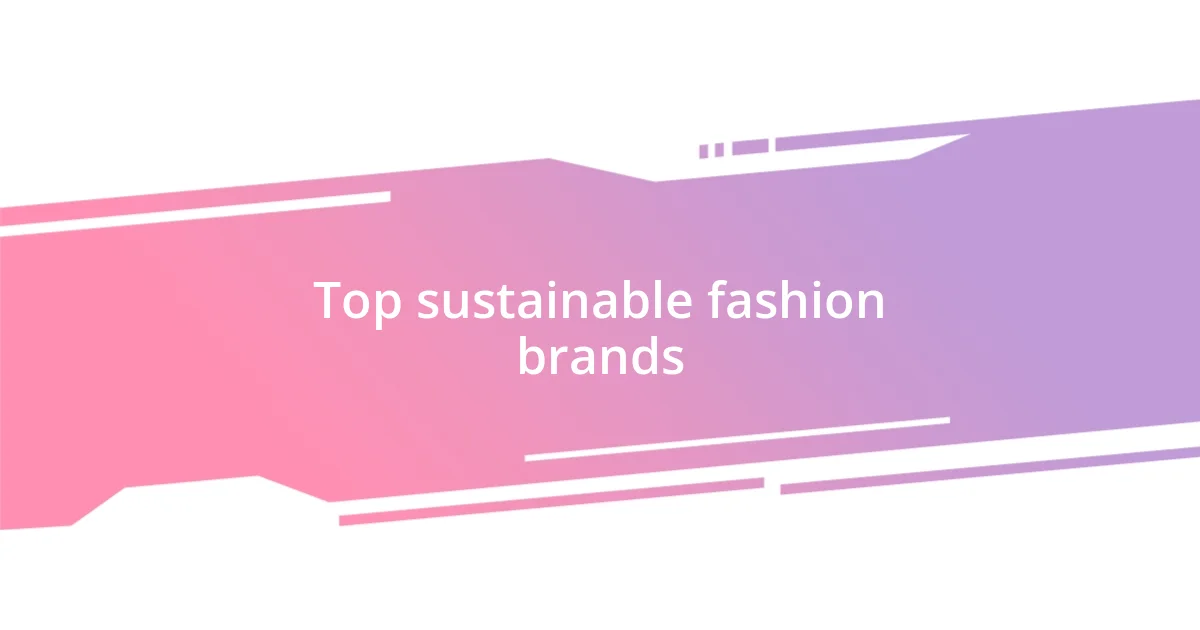
Top sustainable fashion brands
One of the standout brands in sustainable fashion is Patagonia. It’s not just their commitment to quality that resonates with me—it’s their activism for the environment. I remember attending an event called “Worn Wear,” where they encouraged customers to repair their clothes instead of tossing them. Watching people take pride in mending their gear ignited in me a sense of community and responsibility. When I see others engaging in this philosophy, I can’t help but think, how can my choices impact the planet positively?
Another brand that captures my attention is Reformation. They have a knack for blending trendy designs with eco-responsibility. I once tried on a dress from them made of sustainable materials, and I was struck by how chic it felt without compromising my values. The thought that my outfit could symbolize both style and sustainability truly excites me—don’t we all want to make choices that reflect our beliefs?
Everlane also stands out with its “Radical Transparency” approach. They lay bare the true costs of each item, which allows consumers like me to make informed decisions. I still recall the first time I saw their pricing breakdown; it was refreshing and empowering. It sparked a question in my mind: if we know the story behind our clothes, won’t we cherish them more? That mindset makes shopping feel less about consumption and more about connection.

Evaluating brand transparency
Evaluating brand transparency is crucial in sustainable fashion. I remember a time when I stumbled upon a little-known brand that openly shared its production practices on social media. It felt like a breath of fresh air to see behind the curtain. Their commitment to transparency made me feel more secure in my purchasing decisions.
Another instance that stands out for me is when I read an in-depth report on the sustainable practices of a well-known brand. They revealed not just the ‘green’ aspects of their production but also exposed challenges they faced in sourcing materials ethically. This honesty sparked my curiosity: when brands are open about their struggles, doesn’t that create a more genuine connection with consumers like me?
I’ve also found it enlightening when brands provide detailed information about their supply chain. For example, I once engaged with a brand that allowed customers to trace their garments from raw material to retail. This level of openness made me feel like my choices were more than just transactions—they were conversations with a brand that values its impact on the world. It left me wondering, how could every fashion brand integrate such transparency into their story?
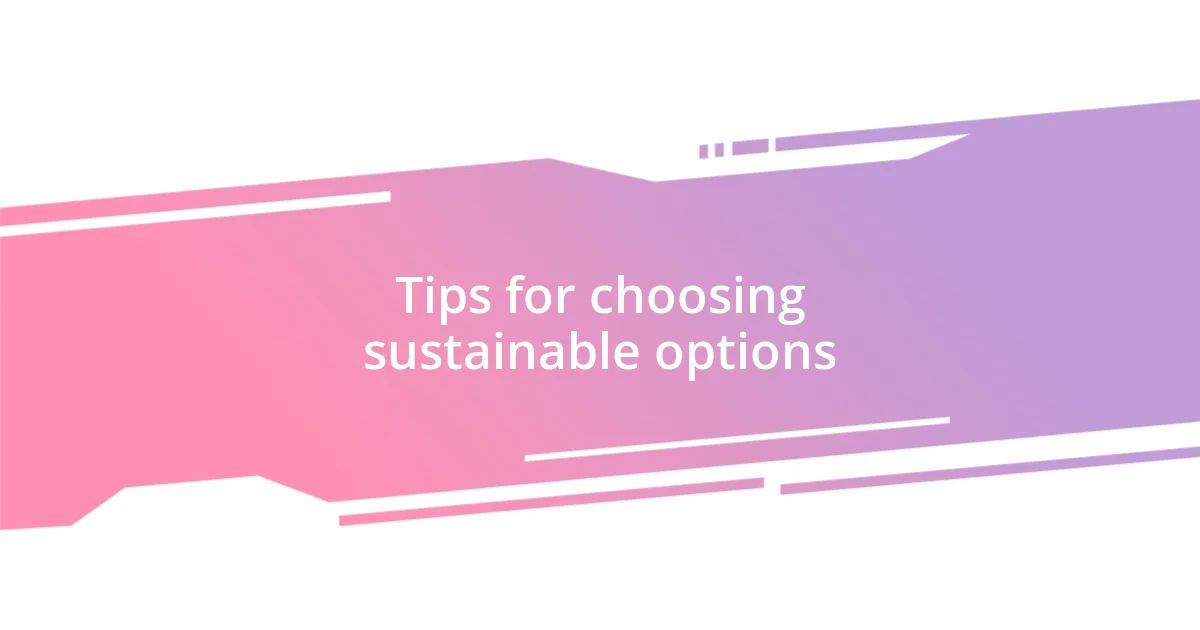
Tips for choosing sustainable options
Choosing sustainable fashion can feel overwhelming, but a few thoughtful tips can make it simpler. One thing I always consider is the materials used in the clothing. I once bought a shirt made from organic cotton and couldn’t believe how soft it felt compared to conventional fabric. It got me thinking: wouldn’t we all prefer to wear something that’s not only comfortable but also kinder to the planet?
Another key factor is brand values. I recall browsing a brand’s website that highlighted its commitment to circular fashion—where they encourage customers to return old items for recycling. It struck me as such a responsible initiative that I actually felt more drawn to their products. This made me wonder, how often do we stop to think about the lifecycle of our clothing?
Lastly, I find it essential to consider the brand’s community impact. I once participated in a local clothing swap organized by a sustainable label, which fostered connections among eco-conscious consumers. It was a refreshing reminder that fashion isn’t just about what we wear—it’s about creating a network that supports sustainable living and mindful choices. In moments like these, I often reflect: how can my shopping habits foster a more ethical and vibrant community?
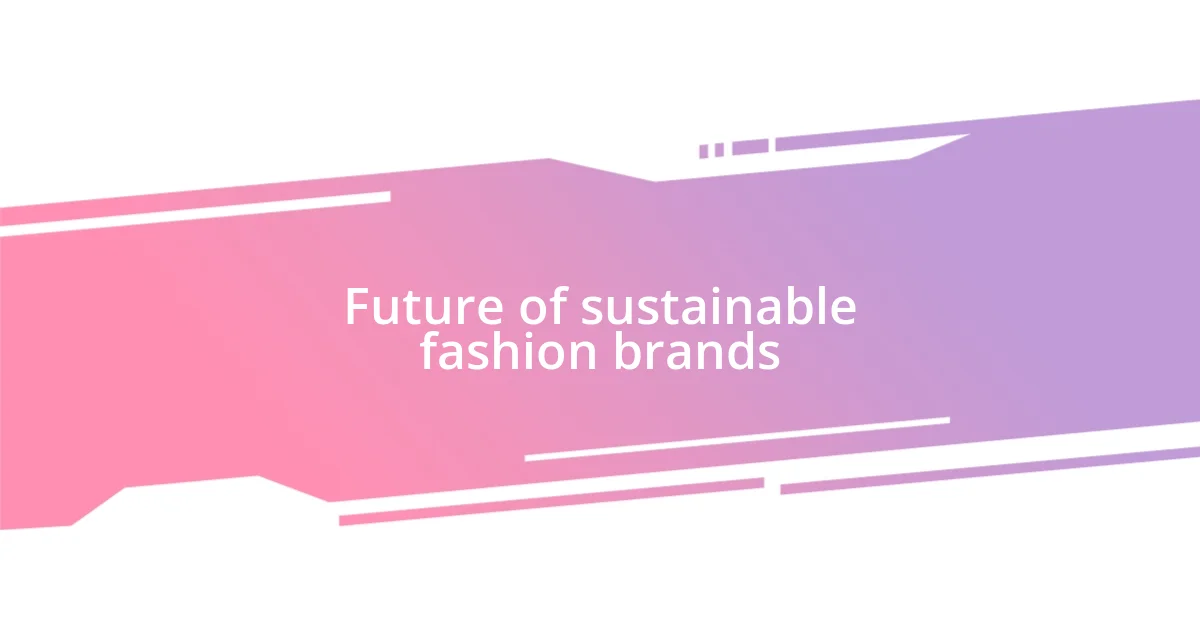
Future of sustainable fashion brands
The future of sustainable fashion brands excites me because I see a shift toward innovation and collaboration. Last year, I attended a sustainability workshop where a visionary brand shared how they’re integrating technology to track their carbon footprint. It made me realize that adaptability is key—if brands can use tech advancements to promote sustainability, we might witness a more eco-friendly industry that appeals to a broader audience.
I’m particularly interested in how consumer behavior will evolve as awareness grows. During a recent online discussion, I reflected on how I’ve started valuing quality over quantity when shopping. Instead of rushing to buy multiple fast-fashion items, I lean towards investing in fewer, high-quality pieces that will last. Could this shift hint at a new era where mindful purchasing becomes the norm rather than the exception?
As I observe the landscape, I believe that collaborations between sustainable brands may be a game-changer. I remember a collaboration between two eco-conscious labels that created a limited collection from recycled materials. The buzz around it was incredible! It got me thinking: could partnerships like these help redefine the fashion narrative, encouraging more brands to work together for a common purpose? The possibilities seem endless as we embrace a future that prioritizes the planet.





